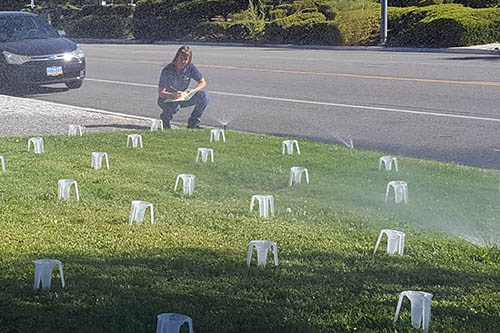 Did you know the average 2.5-person household in Nevada uses 126,000 gallons of water per year, with an average of 75 percent of that being used outdoors? This represents 38,000 gallons more than the average American household.
Did you know the average 2.5-person household in Nevada uses 126,000 gallons of water per year, with an average of 75 percent of that being used outdoors? This represents 38,000 gallons more than the average American household.
The need for water-efficient landscapes in Nevada is nothing new. But as our population continues to grow and the water demand increases, it is becoming more apparent that our landscaping needs to change. Much needs to be done to educate and encourage resource-conscious, water-efficient and sustainable landscapes.
Sustainable landscaping is a rather new concept to our area, but is gaining acceptance throughout the rest of the world. It focuses on ecological, economic and socio-cultural approaches to landscaping that make sense in our dry climate. In developing a sustainable landscape, you create a space that both holds natural precipitation and irrigation water on your land and decreases the money and time used for landscape maintenance. Sustainable landscaping focuses on improving soil and plant health while maintaining a beautiful and functional space.
One way to make your landscape more sustainable is to learn to irrigate more efficiently. A new program in northern Nevada is teaching landscape professionals how to do this.
The Qualified Water Efficient Landscaper (QWEL) Certification Program will be offered for the first time in Nevada this month at the Washoe County Cooperative Extension office, with assistance and support from Truckee Meadows Water Authority and members of the Nevada Landscape Association.
The QWEL curriculum is designed to teach local landscape professionals how to use water efficiently in landscapes as they learn about our local water supply, our soil, and the plants that thrive in our high-desert climate. Participants will learn the basics of efficient irrigation systems and practices. During the training, they will also have the opportunity to perform a simple landscape water audit, which will help them fine-tune an irrigation system to perform more effectively.
After attending the training, participants may take the certification exam. QWEL certification will not only help landscape professionals market their skills, but will also help homeowners find a qualified professional to hire for their water-efficient landscaping needs. Do-it-yourself homeowners are also welcome to attend the QWEL training to obtain knowledge about water-efficient landscaping practices.
Next time you hire a landscaper or irrigation professional, search www.QWEL.net for a QWEL-certified professional in your area. When you hire QWEL-certified professionals, you know that water efficiency and landscape sustainability are at the core of their irrigation installation and maintenance contracts.
With certification of nearly 30 professionals this fall, northern Nevada will be well on its way to creating beautiful landscapes that conserve water, require less maintenance and money, and provide ecological sustainability for our environment.
Fisher, J.
2018,
Look for QWEL-certified pros for your next landscape contract,
Reno Gazette Journal


